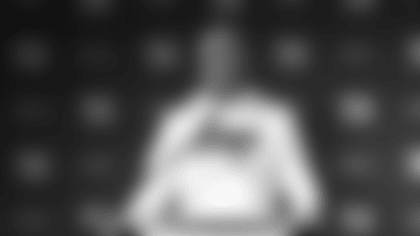Q: Did you get a few holes of golf in this weekend?
A: No. I just got a lot of work done and tried to follow the draft. It worked out all right for us. I'm not really a golfer, actually.
Q: How do you like your new job?
* *A: Loving it. I fell into a great situation because we have really good players and we have the same defensive staff. We just added Jim Herrmann so it is a great situation for me and for our team because there is a lot of carryover.
Q: The assumption on the outside is that you were promoted from within – the scheme and the system will remain largely the same. Is that a fair statement or are you changing a lot?
A: No, I'm not changing a lot. That is a fair statement. I'm sure that was what Tom was thinking when he made the decision myself or Peter Giunta (as) the coordinator because we have had good defense the last couple of years and it is a very sound scheme; proven. And so, yeah, that was, I'm sure, a motivation for him to make that decision to keep it within the staff. No, there won't be a lot of changes. There will be wrinkles that you might not even notice out there. The players will notice them a little bit but basically we will run the same stuff. Because it has been good; it has been proven. Steve arrived from Philadelphia and they have always had a great defense and we are very, very, very similar to those guys.
Q: So you don't expect any starters to change positions like Kiwanuka going back to linebacker?
A: He won't, no. He is going to play defensive end. And that is a fair question. But no, he is going to play defensive end. And you can never have enough pass rushers. Specifically, just talking about him, when we played nickel defense, or sub-defense on third down, he is starting. And you are in that personnel group literally 50-55% of the time every game. At the end of the year we played over 1,000 snaps last year and we had over 500 snaps on sub – nickel personnel. So he is in essence a starter, even though with Osi and Tuck back now, they will be in a rotation at defensive end on first and second down. But when you get to third down, guys like that are starting for you. So no, he is going to be a defensive end. That is where he is going to play.
Q: What about the personality of the defense and your personality being imprinted on defense?
A: That is a fair question. I think – like I said, in general, the main scheme will stay the same. I think probably a couple of things will be --- I told Tom when he talked to me about the job is –I think we will probably be a little more streamlined. We were very, very multiple, which is a headache for the opponent – I don't know how familiar you are with the number of practice reps you get, we don't get the same number of practice reps that you did, let's say, with a college program. You get the kids for a longer time, you have more practice players. So we might be a little more streamlined, nothing dramatic. And we are going to definitely try to have the pass rushers rushing as much as we can. As you know, when you get into zone dogs you have down guys dropping out. And you are never going to get away from that. But as much as we can, we are going to try to orchestrate it where we have the pass rushers rushing, as much as we possibly can. Because that is our strength, and we recognize that and everybody knows that. So that will probably be the two things; maybe a little more streamlined.
Q: What kind of response do you get from guys like Tuck when you say that, "We are going to have you attacking a little more than dropping?" Because I know sometimes they were uncomfortable with that.
A: We haven't asked for how they feel about it too much. We probably won't, either. I'm only assuming that they will be fired up. But I know Mike Waufle has talked to those guys about that a little bit more. So he has kind of set the stage to put some of the onus on them to do something when they do rush. They will be thrilled. I imagine in their minds that is kind of like a necessary evil when they have to play back in coverage. But again, in order to overload your pressures and run the zone dogs that everybody is running now, you have to drop one of those guys in your underneath coverage. So they will be thrilled with it, I'm sure. Because I know Mike Waufle has set the stage a little bit for them, but proposing it to them so that they understand that they have to be productive in the pass rush.
Q: When you made that decision to get away from that a little bit, it was just that these guys are doing stuff that is unnatural?
A: Well it is unnatural and like I said – and Steve did, too – we recognize that is the strength of our team. Jerry Reese, Dave Gettleman and those guys have done a great job, not only through the draft but in free agency of really giving us quality defensive linemen in depth – as good as anybody out there right now. So we know those guys are going to be on the field and we want to play by their strengths – which is rushing the passer.
Q: Last year your sack totals started really strong and dropped off at the end. Is that a function of injuries or was there more to it?
A: I think maybe a little bit is injuries, just even playing the whole year without Osi, who is a dynamic pass rusher. But a lot of it has to do with what the other people are doing and people aren't going to let you – they are trying not to let you knock their quarterback down. So we see a lot of seven-man protections. And it is frustrating because it can negate your pass rush somewhat. They are not getting as many receivers out and so the passing game isn't going to be as complex – it is usually just three-man routes when you are getting that. But a lot of people – they protect us. They go into their gameplanning and they are not so much trying to attack our coverages as they are figuring out how they are going to block our four-man rush.
Q: Backs chipping in?
A: Yes, yes. We get a lot of that. A lot of two-back protections. And so you see a lot of people – they don't do it, but against us they do. So that is a little frustrating. I think it is as much as that. And yeah, we had some guys nicked up, as everybody does. And not having Osi play last year, he is a guy you were counting on for almost double-digit sacks. He can get them.
Q: Do you see Tuck moving to the interior on certain downs?
A: Yeah, on third down – he did that last year. And that would be like a way to get Osi and Mathias as the two ends. And Justin has kind of been – we call him a Joker in some of our three-man fronts …..pass rush on third-down. So he can be a flexible guy and move around and try to get mismatches on a particular lineman or two are away from the back – that kind of stuff. So, yeah, Tuck will be all over the place on third down. He does play inside tackle actually on some of the third down stuff. No, he will do the same thing because he is big and physical. The other guys are a little thinner body. Although Tuck squares off the edges well, but he is big enough that he can play inside and still push the pocket and not be overwhelmed.
Q: The one guy you got up high in the draft – he is another pass rusher.
A: He is. Clint Sintim. And that is what he will be on third down. We have already talked about it. When we practice third down on Thursdays he will be working with Waufle. Last year we played with one linebacker. We played Michael Johnson as our WILL linebacker in sub. And now we are getting Michael Boley, we plan on using him. He is a three-down backer. That is why we acquired him in free agency. So, yeah, Clint is a pass rusher on third down and he will be a first and second down SAM linebacker. And he can do both well. He is a good kid for us. We were fired up about getting him in the second round.
Q: I'm glad you mentioned Boley a second ago because there was a lot of talk that he wasn't used properly in Atlanta – strong side; just not used right in their system. What is it that made him so attractive to you in your system and what you want to do with him?
A: One is, like we just said, he can play all three downs, which with the exception of Antonio, because he is our quarterback out there, we have kept him on the field, but we really haven't had a three-down linebacker. When we had Kawika Mitchell a couple of years ago we played him on third down because he was a good cover linebacker. But that is really Michael Boley's strength, he can run, he is very athletic. That will be the best thing about him – he is an athletic, open field space guy. And so that is as attractive as anything. We knew we could play our sub-personnel. You have to bring another DB in because they are bringing the third wide out, but he can play on all three – third downs. If we played a four wide receiver team, you would take him out and play another corner so you could match up and play man to man. But he should be able to cover the tight ends in our division. And really in any of the schemes he can run and cover the tight ends where we didn't necessarily feel like we had guys like that in the past. For example we played Michael Johnson in that position. But losing James Butler and those guys – and of course we brought some safeties in to give some depth there. And those guys will be competing for playing time as well. But we are not as stockpiled at the safety position – at least not initially when James Butler became a free agent. But yeah, Michael will give us an opportunity to play a guy every single down. And we haven't done that in the last couple of years.
Q: What about your own personality? Defensive coordinators get famous, what they do, how they act, what they say, how they motivate. How is that going to translate for you?
A: I know when I talked to Tom about the job, I told him the number one, in my opinion, the most important thing for a coordinator is competence; that you know scheme and that you can give players that. Because I think you can get up in front of the players and you can be a big rah-rah motivational guy, but the bottom line is, your scheme and your game plan has to be put together each week because the players will know whether or not it is legitimate or not or it is going to work. And so they may love or dislike your personality – that is irrelevant. If you give them a plan each week to go into the game where they feel they are going to have a chance, they will be motivated and they will respond to you. And so that is my approach. Our job really takes place during the week - the hours we spend dissecting the opponent and putting together the game plan with the staff. And we have a fantastic defensive coaching staff. On Sunday you are just calling the game; your plan is unfolding. So that is how I see my job – to make sure we put our guys in the best position to defend what the opponent does and also attack and give the opponent problems. And if we do that, all of the other intangible stuff – Tom handles that – that is his job. He is in charge of the big picture and the team-oriented stuff. And you do want to have a personality on defense. We have a lot of veteran, really good leaders, on our defensive team. And you know who they all are with Antonio and Osi and those guys - Tuck and Fred Robbins and all of those guys. They do a great job and they handle a lot on their own anyway. So our job is to put them into a position, from a scheme standpoint, where they feel confident going into Sundays that, yeah, we have a plan that is going to shut those people down and attack them and get after the quarterback and that kind of stuff.
Q: How about calling the game itself. Is that something that you are going to have to relearn?
A: No, that is going to be fun, actually, because you get to call the defenses. I'm going to work up in the box anyway. I talked to Tom about that - because you want to make logical, calculated decisions on your play calling. And really that is not as complicated as you think, either. Again, if you plan correctly during the week then you are just changing your calls on the different downs and distances and the different personnel groupings that you have. So I think up in the box you have a little calmer atmosphere. You are not down on the sidelines where there can be a lot of mayhem down there. So I will be up there calling the defenses and again, you are thinking those calls out during the week. And all you are doing is once you get the down and distance and you know the personnel that they have in the game, you have your list of calls that you are mixing up as you go through the game. So that will be fine, actually.
Q: Who will be your guy on the sideline that you are talking to?
* *A: The three guys on the sideline will be Mike Waufle, Pete Giunta and Jim Herrmann will be down. So between Jim Herrmann and Pete, they will either signal – of course now we can use the walkie-talkies on defense. So those two guys will be alternating that job. If you do signals you usually have two guys – you have a bluff guy doing it so they don't get a read on your signals. But those guys will be down. Dave Merritt, myself and Al Holcomb will be up in the press box.
Q: You mentioned Herrmann. What is your comfort level with him?
A: Fantastic. I worked for him. He was the defensive coordinator at Michigan when I was there prior to coming here. He is a good friend of mine and he is a fantastic football coach. I have already told all of the linebackers – they will improve dramatically. Especially for the guys that have been here. They have been around me for the last couple of years so they kind of know my thoughts about playing linebacker and how I teach. So to get a new guy in there who is, especially just coming from the Jets, has a little bit different recent background and whole different toolbox of teaching methods and stuff like that, they will grow. This will be a great year for linebackers from a learning standpoint – just being exposed to a quality coach like that. He is very, very passionate, he is a football junkie. He is a football coach, which is what he is. And he will help our defensive staff, both in the game planning staff room as well as on the field. He will help our players – they will play better because of being around him.
Q: We often give Pierce a lot of credit for calling out those sets on the field. The fact that you were his position coach, you must know him like a family member almost. How much easier is that for you now to become the coordinator, knowing that you have him out there in the middle of your defense?
A: It is great. And there is no doubt that we subconsciously get kind of spoiled in the fact that we game plan, we know we can do some checks and automatics at the line of scrimmage knowing that he can handle it. He would probably be bored if he weren't doing it. So maybe there will come a day here sometime in the future where we won't be able to do that – we will have a guy that maybe can't handle as much at the line of scrimmage like he can, like a quarterback. But with him you can. You can really game plan off of formations and sets and know that he can get us into the right kind of fronts and coverages at the line of scrimmage. So it definitely affects how you think when you put your game plan together. It is a wonderful luxury. Like I say, we just take it for granted around here since I have been here. But I'm sure a lot of people don't have that luxury.
Q: Did Pierce's play decline at the end of last season or did we make too much of the Westbrook plays?
A: I laugh – I chuckle when I hear that because I hear that a little bit. I know he was frustrated a little bit because the numbers were down from a tackle standpoint. But if you really dissected the guy and graded him like we do – nobody is more critical of players than position coaches – but that guy absolutely plays his tail off every single Sunday and lays its out and strains his gut for 60 minutes. If his tackle numbers were down, it wasn't because he was missing plays. It is very easy to pinpoint and isolate a few plays – like the one big play against Philly with Westbrook on the touchdown. And we probably put him in a situation he shouldn't have been in. And it never comes down to one guy – a play that long. I hear some of that and to me I chuckle because that guy is as competitive a guy as we have had around here; still is, can still play, and tons of personal pride. That is why he is such a good player. He genuinely cares about his personal performance because he knows it affects our team. He is a good player; has been since he has been here and is going to have a great year this year coming up. He is a good player, yeah. No problem.
Q: Is Clint just a pass rushing specialist linebacker or can he move and play at other linebacker spots?
A: Well, coming in I wouldn't put him in a bunch of different spots. I'm going to try to let him play SAM, which is what he played in college. And we are going to put it on the other guys to learn multiple positions – the other young guys because they have been here for a year. And since the system isn't changing, they should know their base position and be able to play some of the other backup positions. So when he comes in we are just going to line him up at SAM, get him oiled up, at least through the spring, with that kind of stuff. But he can play in coverage. Like I say, on third down is he a good, dynamic pass rusher. He is going to come in the door and weigh 255 pounds, so we are not going to have him playing the nickel inside linebacker drop back in cover. We are going to put him with Waufle and teach him our pass rush schemes. But on first and second down he will play SAM. He did all of the drop stuff at Virginia and had no problem with that stuff. He will be a really good on-the-line player over the tight end because he is so big and physical.
Q: You were chosen for this. You were one of the guys here. Tom could have gone outside but he stayed inside. How big of a deal is this for you?
A: Oh, it is just huge. I'm sure there are few exceptions, but everybody aspires to be either a coordinator or eventually become a head coach. And when you have done this as long as a lot of us have, you get to the point where you think you are overqualified, or, "I don't know if I'm every going to have an opportunity to do it." It is all fun, it is all good, it is all great. It is no – at least right now anyway—because you don't' have to stomp on anybody this weekend, but there is no real….. pressure. There is nothing but excitement and enthusiasm and anxious for it. Like I said, we have a veteran defensive staff. We have all been coaching forever. Just now, somebody else is going to be calling the plays on Sunday and writing down the game plan during the week. But if you ever sat in our staff meeting, with Pete Giunta, Mike Waufle and Dave Merritt and now Jim Herrmann, it is such a collective decision making on a call to call basis and how we game plan all of the different personnel groups and all of the down and distance situations. It is so collective that really, somebody has to call it on Sunday. So you pick a guy to do that.
Q: But that is not the way – Steve got a head coaching job because of how his defense played and how the team played. When the team gave up 80 points in two games people were wondering what the heck he was doing. So it is collective but the praise or the blame goes – it is the coordinator.
A: Yeah.
Q: That is going to be a difference for you also, isn't it?
A: Yeah. I hear what you are saying. That is just part of the deal.
Q: How was the relationship between you and Steve as far as you being able to tell him your thoughts and him acting on it?
A: Steve was great; he was a great guy to work for. You could work for him for a long time because he was democratic in the sense that he wanted to hear input but again there comes a point during the week that you have to make decisions and move on. Otherwise you are going to get stuck in one part of your game plan and never move on to the different down and distances and personnel groups. So he was very decisive. He never had any problems making decisions and going with it. And he really trusted his own intuition and his gut. And that is what made him successful because he was a good coach, had a really good coaching background and could make decisions and make calls and go with his hunch. But he always took feedback and he wanted it. You need the other defensive coaches to kind of cross check you, otherwise you can go off on a tangent and be blind to some stuff. From a position coach's standpoint, you have a much different perspective. And as a coordinator I'm finding out now, and I do appreciate the fact that I know when I was a position coach, you have a much different perspective about the issues with your position and how those guys can grasp the calls and play the different schemes, whereas as a coordinator you might not have had that appreciation. So you are relying on the position coaches to give you feedback like, "Hey, this is going to be tough on my guy" or "Maybe we could do it a little bit like this because it would be easier for my guy to execute his job." And you have to balance that with the other positions but you try to be sensitive to that because again you want to give guys a chance to do well even this might be the best x and o scheme. If it is going to be very unorthodox for a particular position, you have a chance for failure. So you try to stay away from that and you rely on the position coach to give you that kind of feedback. So Steve was great that way.
Q: How many defensive coordinators sit upstairs; what percentage does that in the League?
A: Fewer than more. Not as many. And that doesn't affect my thinking at all. But I imagine that it is very rare. I know Tim Lewis did it when he was here. There are probably a couple of other guys. I know I always thought if I were ever a coordinator I would call from the box. It is like an office atmosphere. You are sitting up there, you have your charts, you can chart your own calls and the opponent. And you have a chance to look, where if you are standing on the sideline, whatever you can't hold in your hand, you can't really refer to. I have always thought it would be a much better situation.
Q: Feedback from the players when they are coming off the field and telling you what is going on. They can't do that from up there.
A: No, but you are getting it from your coaches. That is a good point, but to me you are getting it from your coaches.
Q: You don't get as much face time on TV, though.
* *A: That's okay. This is plenty of face time right now.
Q: Were you up top last year?
A: Yes, since Steve has been here I have been up top. When Tim was up, I was down. And then when Steve was here I went up.
Q: When you talk about the input you get from assistants, do you have to watch out that they are not trying to protect their own guys?
A: That is a good question, you kind of trust that your staff doesn't really think that way subconsciously. And if they do, their intentions are good, because again, they want to have their players to have a chance to be successful. So they are team-oriented guys. They know what we need to do in the big picture of things to stop people, attack people. So you just kind of rely on the fact that they are not that narrow minded where they would only strictly be thinking about guarding their own players from mishaps. That is a fair question but our guys aren't like that. Waufle, Pete, Dave and Jim, they are not like that. They know you have to sacrifice and do some things that are a little uncomfortable for you from a position coach standpoint in order for the big picture to jell together.













